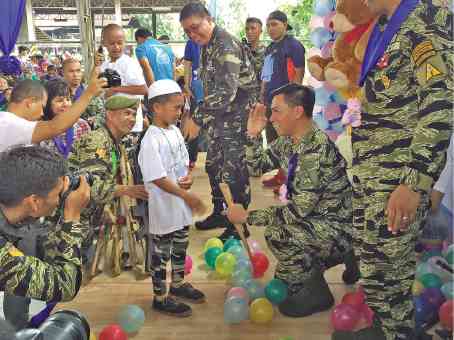In towns where war defined child’s play, toys find their place

Lt. Col. Eliglen Villaflor (kneeling), a former street child, greets a Yakan child who turned over a toy gun in Lamitan, Basilan, a town that had become site of some of the fiercest clashes between government soldiers and members of the Abu Sayyaf. —Julie S. Alipala
LAMITAN CITY, Basilan—Brothers Gajer and Haiser Bendonillo live in a village here where war has changed the way people live, including how children play.
So when the brothers gave up their toy guns, it was with a heavy heart.
“I am giving away my toy gun because I am looking forward to a bicycle,” said Gajer, 10, son of a slain soldier from the 10th Infantry Battalion.
His elder brother, Haiser, wished for something costlier. “A basketball court, basketballs,” said Haiser.
On Tuesday, Gajer and Haiser were among at least 700 Yakan children from the war-torn towns of Ungkaya Pukan, Tipo-tipo and Al-barka, who marched on the city streets carrying their toy guns made of either metal, coco lumber, bamboo or plastic. Some of the toys resembled assault rifles.
Article continues after this advertisementTheir parents escorted the children along with their “big brothers,” government soldiers who took part in a ceremony for peace during which toy guns were turned over in exchange for other toys.
Article continues after this advertisementEzra, mother of the Bendonillo brothers, said it was the first time the children were asked to surrender their toy guns for replacement with bicycles and other toys like dolls, scooters, board games, basketballs and educational stuff.
“I don’t object to the idea,” said Ezra. “My son grew up with his toy gun. He never had other toys,” she said of Haiser.
Haiser got a basketball but Gajer didn’t get his bicycle.
Thousands of pieces of toys and other items, like food, school supplies and sports equipment, had been shipped to the city for the children, who are beneficiaries of the Festival of Love and Peace initiated by Dr. Arlyn Jawad Jumao-as’ Save the Children of Basilan.
“We see great transformation in these children,” said Jumao-as.
In 2014, Save the Children reached out to a total of 250 children. Of the number, only one has not returned to school.
“The rest are back to school,” said Jumao-as.
It was a different story three years ago.
“It was so emotionally charged,’ said Jumao-as, recalling stories told by children about surviving war “and how war stole their youth.”
“These have changed,” said the child rights’ advocate.
Lt. Col. Eliglen Villaflor, Special Forces Regiment chief of staff who once headed the 4th Special Forces Battalion in Basilan province, recalled his encounter with children when Save the Children was launched.
“When we asked kids to draw soldiers, they drew soldiers shooting their mothers, fathers and themselves,” said Villaflor.
“One child drew an aircraft diving toward their home and dropping bombs,” Villaflor said.
Three years after that, Villaflor said he sees the transformation.
“They now have the drive to go to school, to join sports, to play,” he said.